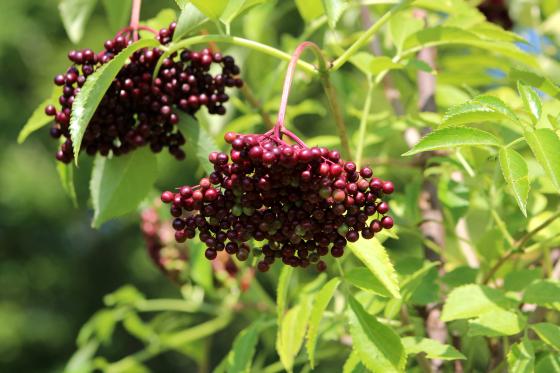Posted November 10, 2016 at 08:38am by Cheryl Herrick
Guide to Growing and Marketing Elderberries Published by UVM Extension Center for Sustainable Ag.

Capping years of research, outreach, conversations, workshops and on-farm observing and learning, the UVM Extension Center for Sustainable Agriculture has published Growing Elderberries: A Production Manual and Enterprise Viability Guide for Vermont and the Northeast.
The guide came about in response to farmers and landowners expressing interest in non-traditional crops to add to their mix of enterprises, and seeking ways to make marginal lands productive. The elderberry, a traditional wild-crafted European favorite with its white spring flowers, dark berries in summer, tolerance for a variety of conditions, tart flavor and anti-oxidant and anti-viral properties, offered promise.
With funding from the Vermont Working Lands Enterprise Initiative and the Vermont Farm & Forest Viability Program, the guide offers detailed information on how to select, cultivate, harvest and process elderberries, as well as economic models to help growers determine the potential for profitability in their particular situation.
Rose Wilson served as market and enterprise analyst and principal author, working closely with editor and project coordinator Ginger Nickerson and a team of farmers, processors, Extension advisers, contributing authors and reviewers from Vermont and Maine.
According to Nickerson, "This guide is directed towards people with an interest in growing elderberry for profit, and is intended to help them determine if elderberry is the right commercial crop for them." However, as she notes in the guide's introduction, "there is also much information that will be of use to backyard gardeners and people who want to make elderberry-based products for their friends and family."
The guide is available for free download on the Elderberry Project page of the Center's website.
Established in 1994, the UVM Extension Center for Sustainable Agriculture provides timely information to Vermont communities and the UVM campus. Center staff conduct innovative research, support the development of promising practices, cultivate partnership, and inform policy to advance sustainable food and farming systems
University of Vermont Extension, and U.S. Department of Agriculture, cooperating, offer education and employment to everyone without regard to race, color, national origin, gender, religion, age, disability, political beliefs, sexual orientation, and marital or familial status. This institution is an equal opportunity provider.
